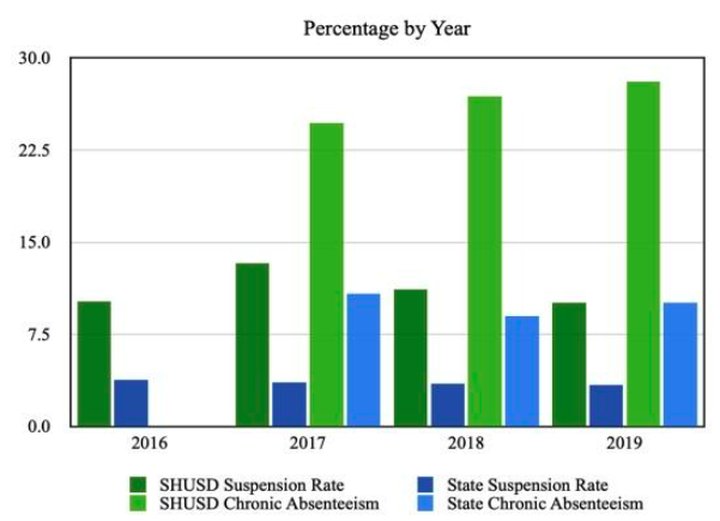
Whitethorn School students eating lunch. | Image via SHUSD.
# # #
In a sprawling rural region beset by a faltering economy and declining student enrollment, the Southern Humboldt Unified School District needs better leadership — and more money.
Those are two of the conclusions drawn in a report released this morning by the Humboldt County Civil Grand Jury, an independent judicial body comprised of volunteer jurors tasked with investigating local government.
This particular investigation was prompted by complaints from parents and employees about the leadership and management of the SHUSD, and the Grand Jury found those calls for alarm justified.
“The District is in decline without [a] short or long-term vision for sustainability,” the report’s authors state.
Among the complaints from parents and employees was a charge that discipline was being unevenly applied, and the Grand Jury found that to be true. The report also concludes that the district’s five-member Board of Trustees “has demonstrated a lack of commitment to openness of public meetings” and says there needs to be more community involvement in school-related issues and activities.
The elephant in the room, which goes conspicuously unmentioned in this report, is the cannabis industry. As anyone with even a passing familiarity with the region can attest, weed has long served as SoHum’s economic backbone. Post-legalization declines in the industry have hit the community hard, eroding the fiscal foundation of civic institutions such as the Mateel Community Center.
[Side note: The district itself chooses to avoid mention of the cash crop. The Grand Jury report includes this almost comically misleading quote from the SHUSD website: “Employment in the southern part of Humboldt County is supplied mostly by timber, commercial fishing, tourism, the school district and state agencies.” Y’all forgot something!]
The economic woes have led many residents, particularly families, to pick up stakes and move elsewhere, and that’s having a negative impact on the school system’s finances.
“While dedicated teachers, parents and management are concerned about the students they serve, they are powerless to stem the decline of enrollment,” the Grand Jury report says.
The district is so sparsely populated now that there’s less than a single student per square mile, on average: 760 students spread across 773 square miles, a region nearly two-thirds the size of Rhode Island.
There were once 19 individual school districts in this area, but they were combined into one in 1948. The district is now comprised of four elementary schools, Miranda Junior High School, South Fork High School and The Osprey Learning Center, an institutional umbrella for alternative programs including independent study and continuation classes.
The demographic challenges make it hard to recruit and retain employees in the district, too. Several employees have to commute “great distances” to work, and some are forced to fill multiple positions due to budget and staffing shortages, the report notes.
Meanwhile, few local residents have the certifications required to fill teacher positions, and the region’s poor wage prospects and lack of affordable housing make outside recruitment challenging.

Graph published in the Grand Jury report, with information from the 2019 California Dashboard.
District-wide, students get suspended and are chronically absent at much higher rates than the state average, as shown in the graph above. Absenteeism during the 2018-19 school year was almost three times the state average, and since schools get reimbursed for students in seats, this trend yields yet another negative impact on school budgets.
As for leadership, the Grand Jury noted high turnover in the position of superintendent/principal and a failure to provide necessary leadership even when the position is filled. “[T]he District has been deprived of an invested, enthusiastic, and effective leader,” the report states.
Last year, a group of community members petitioned the SHUSD Board of Trustees in hopes of creating a new charter school, but the board denied the request by a vote of 3-2. However, the charter group appealed that decision to the Humboldt County Office of Education, and the charter was granted, allowing the creation of the Agnes J. Johnson Charter School in Weott.
The Grand Jury notes that this new school will not be eligible for state transportation funds, which will likely create even more financial strain on parents. “The establishment of a Charter school through the Humboldt County Board of Education will have a negative financial impact upon the Southern Humboldt Unified School District,” the authors state.
The report concludes with a list of recommendations. One is for the district to try to drum up more community engagement by holding a public information meeting and by creating “an easy-to-navigate section on the District website detailing how to become a board member, as well as the need for citizen participation.”
The Board of Trustees should attend training regarding its legal responsibilities under public meeting laws, including the Brown Act, and it should “articulate and publish a clear vision for the future of the District,” the report says.
As for district financing, the Grand Jury says the board should “aggressively pursue creative funding ideas,” including state and federal grants and charitable donations from businesses and wealthy benefactors.
All district personnel, including volunteers, should receive training in discipline policies and procedures, and those procedures should be standardized, the report says.
Finally, the Grand Jury finds that the Humboldt County Office of Education should “perform an intervention … to assist the District in achieving financial stability, a district-wide positive behavior program, and academic rigor.”
The Civil Grand Jury is requesting official responses to the report from the district’s Board of Trustees, the Humboldt County Office of Education and the county’s superintendent of schools.
The full report can be downloaded by clicking here.
# # #
PREVIOUSLY: Civil Grand Jury Issues Glowing Report on Local Prison Camps, Suggests Training Jail Inmates to Fight Fires
CLICK TO MANAGE